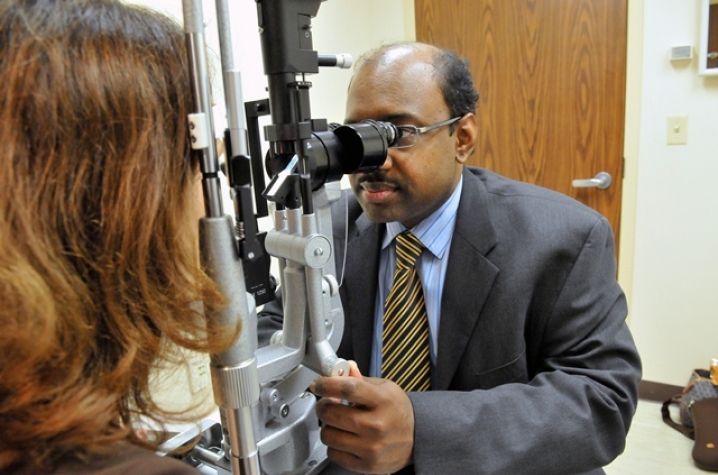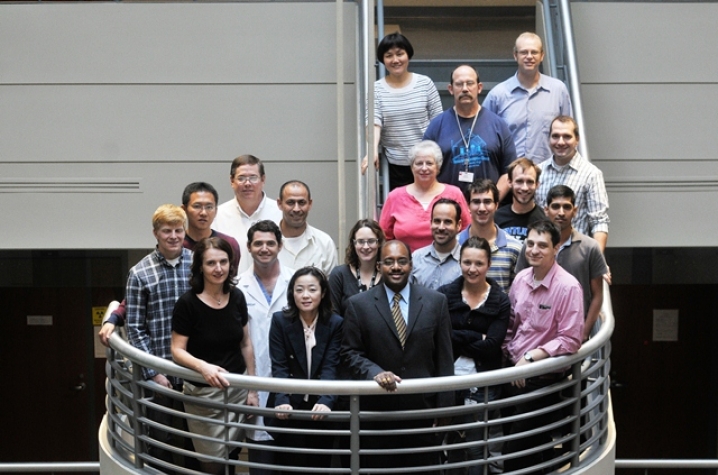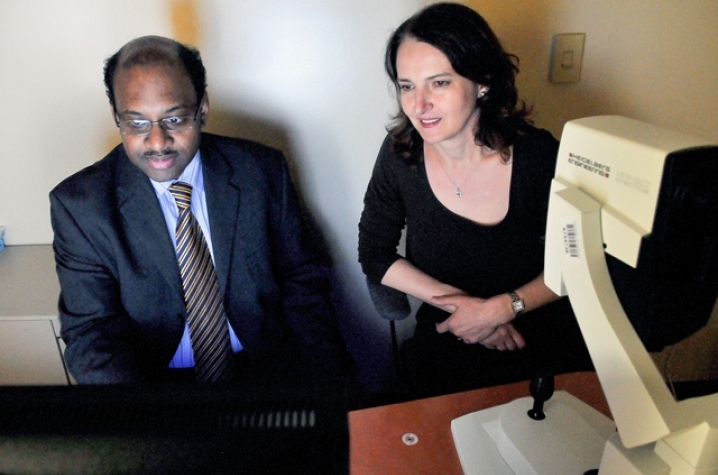UK Researcher Has a Passion for Solving Puzzles
LEXINGTON, Ky. (May 8, 2012) − Much has been written about Jayakrishna Ambati since he came to the University of Kentucky in 2001 to begin a career in medicine and research. He is well-known in medical and scientific communities, both nationally and internationally, for his work on age-related macular degeneration (AMD), the leading cause of untreatable blindness that affects hundreds of thousands of people each year.
Ambati, professor of Physiology and professor and vice-chair of the Department of Ophthalmology and Visual Sciences at the UK College of Medicine, and his team in the Ambati Lab have made major breakthrough discoveries that continually influence and reshape the scientific paradigm in AMD research. The studies have been published in the most prestigious scientific journals such as Nature, Cell, Nature Medicine, The Journal of Clinical Investigation, and the Proceedings of the National Academy of Sciences.
Ambati's list of honors and awards is exhaustive. However, if you peel back the layers of accolades, accomplishments and publications, what really motivates this UK standout researcher to push so hard to solve the mysterious AMD puzzle?
Many words can be used to describe Ambati: exacting, logical, deductive, driven. Many words can be used to describe his journey at UK: physician, scientist, professor, and leader. Perhaps the less known descriptor is student.
"What brought me to medicine is to help people see better," Ambati said. "My patients are my greatest teachers. I can look at what has gone awry in their eye and take their problems into the lab to try to find the answers, to make the pieces of the AMD puzzle fit, and take what I learn back into the clinic to help the patient. The traditional philosophy of translational research is bench to bedside. However, in our group, we consider it more bedside to bench to bedside. Translational research has to start at the bedside by looking at what is ailing the patient and trying to change it."
The puzzle of blinding eye disease is a challenge that Ambati eagerly takes on and he considers the challenges associated with such a daunting task merely opportunities to find solutions. Since he was a child, he enjoyed solving puzzles and knew very early that he wanted to be a physician, heavily influenced by his role models -- an uncle who is a physician; a friend who is a retina surgeon; his younger brother, also an ophthalmologist; and his parents (both professors) who emphasized the nobility of medicine and the beauty of inquiry.
"The eye is a beautiful organ and its function is undeniably important," Ambati said. "The ability to repair and to restore vision can bring happiness to the patient and to the physician."
Ambati isn't alone in his mission and praises his team, an international group of top-tier scientists and clinicians. There are no individual projects in Ambati's lab and everyone works on every project.
"They really do work well together as a team, like a finely tuned orchestra" Ambati said. "Every team member brings different strengths and expertise to the table. I appreciate the industry, creativity and hard work of my team members as we attack these problems that plague the eye."
Ambati can talk at length about cells, molecules, double-stranded RNAs and the like, but he's not the stereotypical scientist, as some might imagine, spending the entirety of his time locked away in a laboratory studying formulas and slides. He is very much a 'people person', a man who cares a great deal about his team, is very family oriented and patient centered.
When he speaks, his voice is quiet but he puts great emphasis on words that describe the numbers of people affected by AMD and their fear of losing eyesight, almost as if he feels the fear for them. "The number of people in the U.S. with macular degeneration is greater than that with all types of cancer combined," he said. "Macular degeneration can lead to blindness, something that people fear even more than premature death."
Ambati is quick to point out that his wife Kameshwari, an organic chemist, and daughters Meenakshi and Vidya, are more vital to his success than any other facet. When asked what he considers to be his greatest accomplishments, Ambati enthusiastically replies, "my two daughters." In fact, the scientist who works to find a cure for blindness by day, devotes his early evenings to math and geography homework with his daughters, ages 7 and 5, listening to them play the piano, or watching them dance.
Although Ambati's research has taken him all over the world, he seems to enjoy home most of all. He appreciates being able to discuss his work with his wife and sharing meal time with his family, something he considers very important. "I've had the good fortune of dining at some of the finest restaurants around the world. For me, however, there is nothing quite as delectable and filling as sumptuous Indian food at home."
Ambati has been at UK for 11 years and in that time, he and his team have pushed UK to the forefront of AMD research as a major player in the quest to eradicate blindness due to AMD. However, Ambati says that he has not yet achieved his greatest accomplishment professionally. So every day he goes back to the puzzle, looking for new ways to make the pieces fit.
###
Ambati is the first ophthalmologist to win the Doris Duke Distinguished Clinical Scientist Award and a Burroughs Wellcome Fund Clinical Scientist Award in Translational Research. He was also elected to The American Society for Clinical Investigation and was the first ophthalmologist to be elected to The Association of American Physicians. He has been elected as a Fellow of the American Association for the Advancement of Science. He also serves on the Editorial Board of Investigative Ophthalmology & Visual Sciences and is an Associate Editor of Ophthalmology and of Translational Vision Science & Technology. He won the 2010 ARVO Cogan Award, and his Cogan Lecture was recognized with the 2010 Cless Best of the Best Award. He also won the 2010 Roger H. Johnson Memorial Award for Macular Degeneration Research, and a 2010 Research to Prevent Blindness Senior Scientific Investigator Award. He has been named winner of the 2011 AFER/Pfizer Ophthalmics/Carl Camras Translational Research Award.










